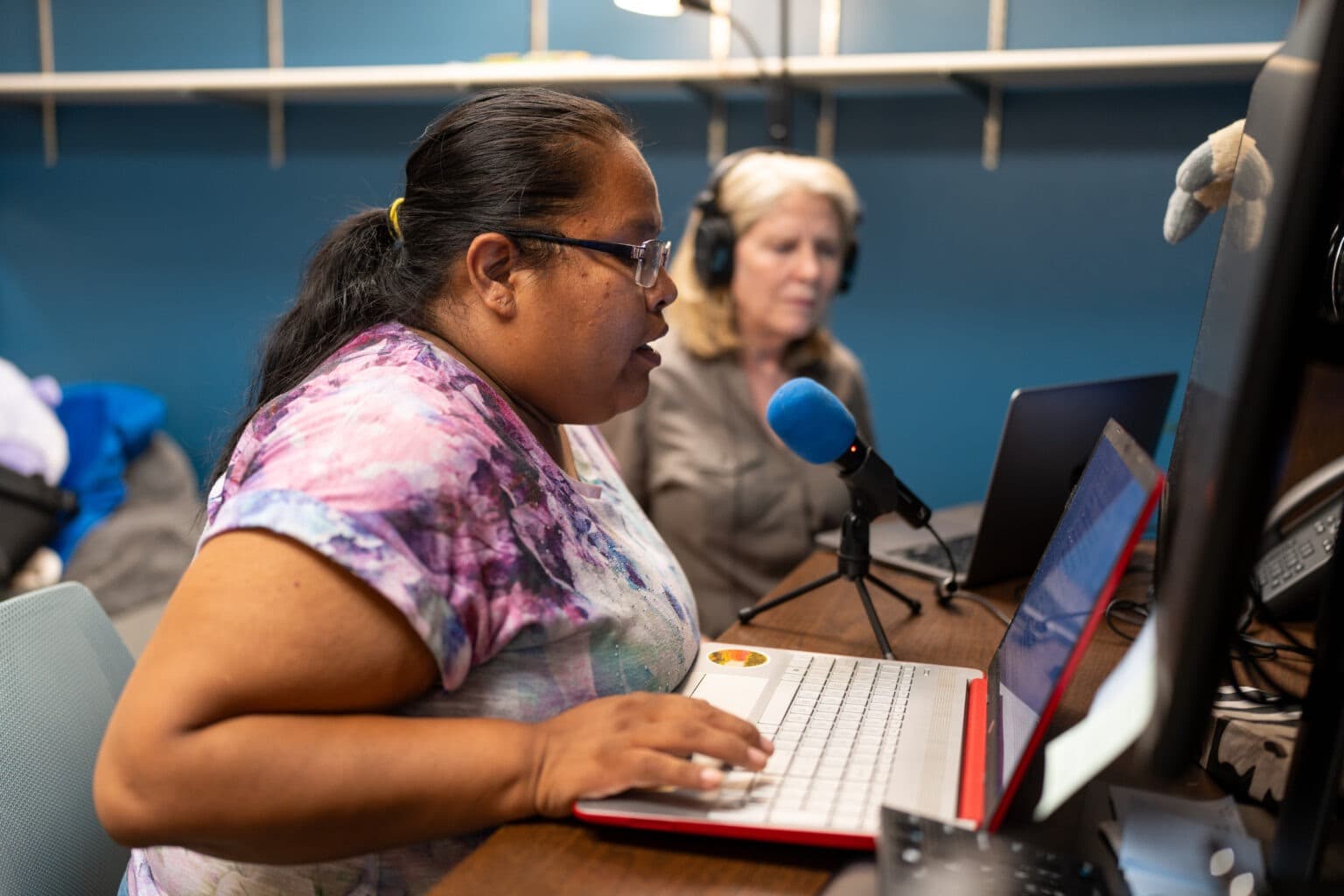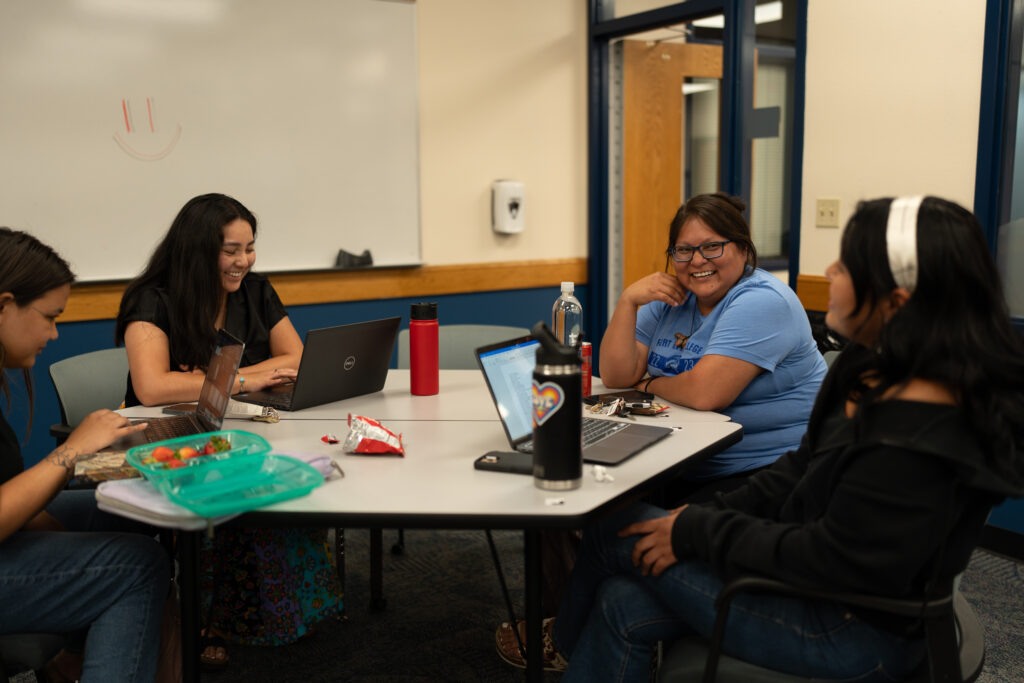The billboard project is expanding to Oregon
Native students learn how to preserve threatened languages through Fort Lewis initiative
Jason Gonzales
Chalkbeat Colorado

TR Mitchell records a voiceover for an audio story during an All Our Kin class. Mary Ann McNair, director of StoryCenter, a company that helps facilitate storytelling projects, helps Mitchell with the recording.
Almost 30 years ago, the majority of Native American students at Fort Lewis College could speak their home language, Janine Fitzgerald recalled.
In the years since, more and more students have arrived at the southwest Colorado college without the ability to speak their native language, the Fort Lewis sociology and human services professor said. Nonetheless, these students have wanted to better connect with their family, their culture, and their traditions.
To assist, Fort Lewis College and Fitzgerald created the All Our Kin Collective this year to help address the loss of indigenous languages in students’ communities and help them understand a crucial part of their identities. Fitzgerald, who has an interest in sociolinguistics, was awarded a $1.5 million grant through the Mellon Foundation, as well as support from the National Endowment for the Humanities, to start the collective.
About 44% of Fort Lewis College’s students are Native American, and the collective has created programs, including a summer institute, classes, and a certificate program, that help those students learn and share their language.
Fitzgerald said many Native students have cited that learning their language and sharing culture are even more vital since the pandemic because so many elders who carried on this knowledge died from Covid. Many students believe that the death of tribal elders will also cause some traditions to begin to die, she said.
“And there’s this sort of deep understanding among students — deep — where they say. ‘I got to learn,’” Fitzgerald said. “That it’s super important and ‘I can’t be whole without it.’”
The collective adds to Fort Lewis’ push to compensate for its past as a Native American boarding school. The Fort Lewis boarding school, and many others throughout the U.S. and Canada, were created with the goal of eradicating Native American culture. Students were required to learn English and taught their traditions were inferior.
Fort Lewis College leaders have now pushed to become a place for Native students to further their schooling while also embracing who they are as Indigenous people.
Ally Gee, who is Navajo and a Fort Lewis College graduate working with the collective, said the project is meant to help students connect to who they are. Many students complain that they don’t feel as deep a tie to their culture as they want because they don’t know their language, she said. It’s a vital part of who Native people are, she added.
“If I could help just one student learn just one word, I would measure that as a success,” she said. “Students are learning their cultures, how to introduce themselves, and the meaning of their names. And that’s really heartwarming.”
Students, however, are learning more than just a few words, said Shannen Jones, 31, who recently graduated from Fort Lewis and participated in the collective’s summer institute. She said she expected to just learn how to speak and write in her native Navajo language.
She found that the summer institute offered so much more.

Instructors focused not on grammar and spelling but on the skills needed to learn how to document and learn languages without a textbook, Jones said. Those skills allow students to not only learn how to speak, but preserve the language for future generations by documenting what they learned.
The for-credit, three-week summer institute is focused on four languages. In its first year, the classes featured Navajo, Cherokee, Inupiaq, and Hopi. Program leaders hope to change which languages are taught depending on the students who are enrolled.
Another component of the collective includes one-credit classes that focus on language and cultural identity. The classes include teaching students about preserving languages and how to do that through new technology.
The collective’s programs also allow students the opportunity to take a series of classes that lead to a certificate in language revitalization, including learning about Native languages, doing an internship, and finishing a series of online classes.
The collective documents work from students to help celebrate and preserve indigenous cultures through a digital archive which includes students’ projects and culturally significant material.
Jones participated in the All Our Kin fellowship, which gives students $750 and the ability to work on projects.
As part of her work, Jones led group conversations during the summer program. At first, she looked at the assignment as more of a job, but she left feeling empowered.
Leading group conversations gave her hands-on experience working with other Native students and she wants to take that experience back to her home in Arizona or to other Native communities. She plans to work in public health.
The classes, most of all, helped Jones feel closer to her roots and her peers.
“Around language, we found a sense of community that some of us were missing,” Jones said. “Every time I think about the classes, I get excited. It was an amazing feeling seeing everyone working together.”
This story is co-published through AP StoryShare. Jason Gonzales is a reporter covering higher education and the Colorado legislature. Chalkbeat Colorado partners with Open Campus on higher education coverage. Contact Jason at jgonzales@chalkbeat.org.
External
Identification not yet made
UTTC International Powwow attendees share their rules for a fun and considerate event
Radio collaboration highlights importance of cooperation in a season of funding cuts for local media
A memorial in the Snow County Prison, now the United Tribes Technical College campus
Standing Rock Sioux Tribal Chairwoman Janet Alkire tells crowd, ‘We’re going to rely on each other’






